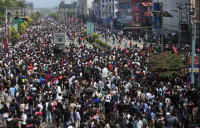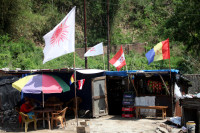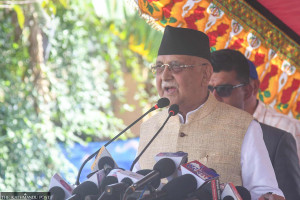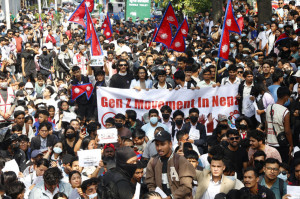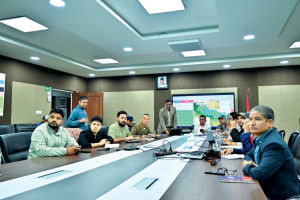Opinion
Buddhist economics
It is worth pondering why Nepal could never take advantage of having a major religious site
Rajesh Gautam
Lord Buddha’s birthday, known as Buddha Jayanti, has great cultural significance in his birthplace Nepal. Taking this into account, the government decided to celebrate the occasion by hosting the third Buddhist International Conference on May 19 and 20 in Kathmandu, followed by a ceremony in Lumbini on May 21—the day of Buddha Jayanti.
Buddhist traditions and heritage are not only the nation’s cultural assets; they also provide opportunities for socio-economic gains. They are potentially huge resources that can contribute to uplifting the socio-economic status and living standards of the people.
Possible opportunities
Lumbini, the birthplace of Lord Buddha, is one of the major tourist destinations of the world. It is a holy site for more than 535 million Buddhists and a centre of spiritual belief for many. If we could attract just one percent of this population to Nepal, it will generate a massive amount of direct and indirect employment in the country.
Many Nepalis are employed as artists making Buddhist artefacts. The grandeur, spirituality and holiness of thangkas, Tibetan Buddhist painting on cotton, or silk appliqué, usually depicting a Buddhist deity, scene, or mandala, attract connoisseurs of art and craft to the country. The demand for Nepali sculptures is also quiet high in the international market. Promoting Buddhist thangkas and sculptures is clearly beneficial for the country, but for that the younger generation of Nepalis should be encouraged to take up the traditional occupations.
Being a centre of Buddhist philosophy and spirituality, Nepal can be an academic hub for the study of Buddhism. Constructing academic centres and providing different levels education on Buddhism can make Nepal an education-tourism hot spot. Promoting religious tourism could also contribute to the country’s tourism sector.
Religious sites like Macca-Madina, Jerusalem and others are of high value and importance for various religious communities, so they receive financial support for their maintenance. It is worth pondering why Nepal could never take advantage of having a major religious site. Nepal needs to initiate the process of uplifting the international status of Lumbini and to explore many Buddha-related religious places like Tilaurakot, Debdaha, Ramgram and others.
Way forward
The government needs to formulate and implement long- and short-term polices on the development and exploration of Buddhist culture, arts and heritage. There is also a need for investment in the protection and development of sculptures, thangkas and other craft industries. The organisations working in this field need to be reformed. Lumbini Development Trust, for example, should be made more effective with professional leadership and efficient staff. The organisational structure of the trust should be developed in such a manner that it has access to and good relations with national and international Buddhist communities.
Developing infrastructures in Buddhist destinations is also required. Historic monasteries located at remote areas should be protected and explored. Good relations with monasteries outside the country can contribute to maintenance, development and exploration of these historically and religiously valuable heritages. An internal Buddhist circuit can also be developed.
Similarly, a research centre for Buddhist philosophy has to be established with the assistance of international Buddhist communities. The Buddhist Philosophy Promotion and Monastery Development Committee needs to work more actively, with strong coordination with similar national and international communities. The linkages between national institutions and international organisations are not only for resource acquisition but also for promoting Nepali tourism and cultural products in international markets. Assistance should be asked from countries with Buddhist culture and tradition. For this purpose, Nepali diplomatic missions should be mobilised in an effective manner; accrediting religious attachés to such countries may be one way of enhancing their effectiveness.
By hosting the International Buddhist Seminar to celebrate Buddha Jayanti, the government has acknowledged its responsibility for developing and exploring Buddhist cultures and heritages in the country. This is indeed welcome. A major concern, however, is whether such efforts would be continued through appropriate policies and funds. Government budget has a very huge impact on the implementation of programmes of national priorities. The government should therefore accord due importance to developing Buddhist culture and heritage, and allocate necessary funds for this purpose. Strong political commitment and consensus are necessary for this.
Gautam is with the Ministry of Culture, Tourism and Civil Aviation




 16.12°C Kathmandu
16.12°C Kathmandu


